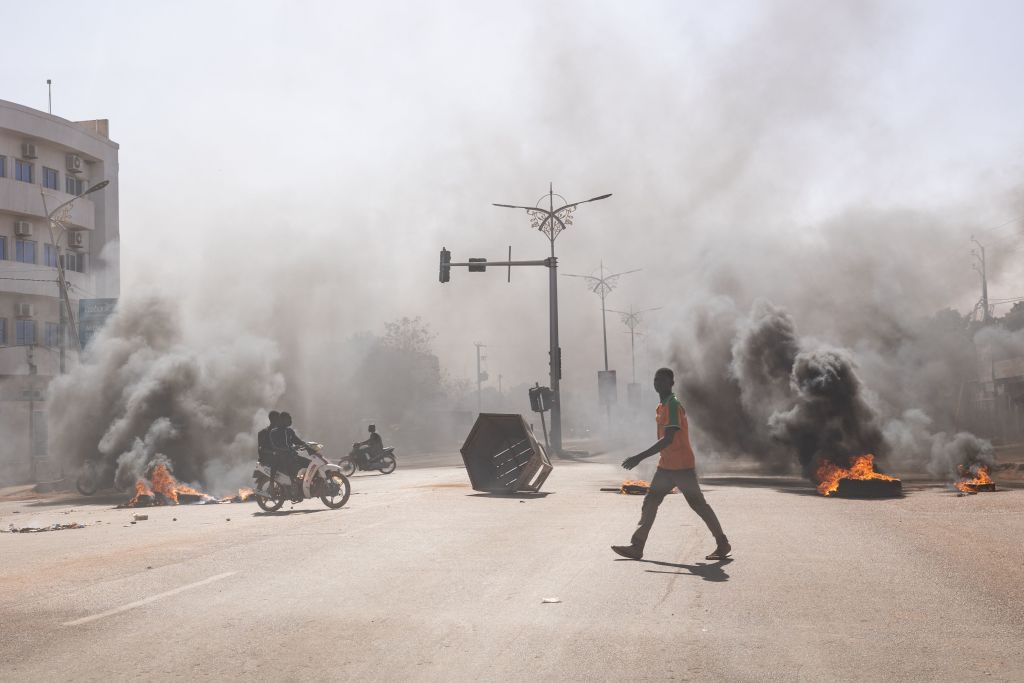ADF STAFF
Days after a coup d’etat in Burkina Faso in early 2022, a reporter stood on the campus of Joseph Ki-Zerbo University in Ouagadougou and asked students how they felt.
A third-year philosophy student named Kadlé expressed a sentiment echoed by many Burkinabe.
“We need elections, we need democracy, but if it doesn’t get results, what use is it?” he told Radio France Internationale.
It’s a view repeated all over the Sahel region. A lack of security has left fed up citizens willing to support anyone who promises a return to safety. This, combined with a crisis of confidence in the state, has given an opening to military coup leaders.
Dr. Folahanmi Aina of Kings College, an expert in security in the region, calls it “vertical mistrust.” The social contract between the people and the state has been broken, making people willing to look for alternatives.
“It breeds resentment towards the state, and it tends to delegitimize the authority of the state,” he told ADF. “Because the social contract between the state and society says the state is supposed to be providing certain public goods to society and, in exchange, society is supposed to pledge allegiance to the state. But in the absence of this, you’ve got tension.”
Recent history shows coup leaders are rarely able to deliver on their security promises.
In the first half of 2022, as political instability raged in the Sahel, there were 2,272 civilian deaths in Burkina Faso, Mali and Niger. That total was more than the entire previous year.
Burkina Faso, which experienced two coups in 2022, is on pace to record more than 1,500 violent events and 3,800 fatalities for the year, the Africa Center for Strategic Studies reported. This represents a 35% increase from the previous year.
Aina said it is unsurprising that military-led governments are unable to halt extremist violence. These governments tend to offer a military-first approach to complex problems that require a whole-of-society effort.
“Because of their traditional posture of using force, they do what they’re good at doing to try to solve problems, which do not only require the use of force,” Aina said.
Extremist groups seize on this failure as a recruiting tool, he said. They point to heavy-handed military tactics and civilian casualties in their propaganda efforts.
“The approach [is] pushing the vulnerable into joining jihadist groups, rather than pulling them away from extremist ideologies,” Aina wrote for the Conversation. “The jihadist groups in the region are likely also to intensify their influence operations across the region — aimed at winning the hearts and minds of the locals.”
In some villages in northern Burkina Faso, extremist groups have capitalized on a lack of state presence to seal off towns, administer harsh justice and extract taxes. Overall, observers say, these groups are content to patiently wait for the military governments to collapse.
“The jihadists have implemented a strategy of attrition which consists of being patient, sowing the seeds of division, dismantling our political system and destabilizing the social order,” Mahamoudou Savadogo, a Burkinabe security consultant, told TV5 Monde.
A report by the International Crisis Group (ICG) warned that the long-term goal of violent extremist groups is to use Burkina Faso as a platform to expand south.
“Burkina’s history, society, economy and politics are interwoven with those of its southern neighbours,” ICG wrote. “It could serve as an open door to the Gulf of Guinea. With militants sinking roots in Burkina, they would occupy an ideal position for moving south.”
If extremism gains a foothold in already fragile Gulf nations, Aina worries this could portend more political unrest.
“What we’re seeing is probably the least of it,” he told ADF. “In my opinion, and from watching obvious trends, West Africa can expect to see more coups.”

